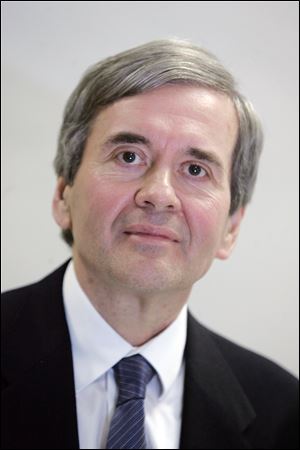
COMMENTARY
Washington can help keep Toledo on the make
3/2/2014
Kushma

Kushma
Making things still matters — a lot.
However the American economy evolves, we’ll always need a strong, competitive, modern manufacturing base. That’s especially important to a blue-collar community such as Toledo, which seeks to adapt its traditional industrial strengths and advantages to the changing demands of the 21st century global marketplace.
Some folks in Washington understand this. President Obama announced last week that the Detroit region — defined in this instance as including a big chunk of Ohio — will get one of two new manufacturing innovation institutes; his hometown of Chicago is getting the other one.
These high-tech centers, like similar institutes already established in Youngstown and Raleigh, N.C., aim to promote advanced manufacturing, create good middle-class jobs, train workers and students in new-technology industries, help small and medium-sized companies gain leading-edge capabilities, attract private investment, and strengthen the nation’s defense. They will rely on partnerships among companies, universities, nonprofit groups, and the Defense Department and other federal agencies.
The Michigan regional hub, in the Detroit suburb of Canton, will focus on research and development of lightweight and modern metals. It will involve the participation of such major Ohio institutions as Ohio State University (working side by side with the University of Michigan — imagine), the Columbus-based Edison Welding Institute Inc., and state government. The White House estimates that the applied research emerging from the hub could yield as many as 10,000 jobs in five years, many of them in this region.

Beside a set of robotic arms, President Obama spoke about manufacturing innovation institutes last week at the White House.
Thinking even bigger, Ohio’s senior U.S. senator, Democrat Sherrod Brown, is the chief sponsor of legislation that would create a national network of dozens of centers of manufacturing innovation, also built on public-private partnerships and eligible for federal aid. Despite the dismal productivity record of the current Congress, the prospects for bipartisan action on Mr. Brown’s bill this year look reasonably promising.
The White House announcement has brought renewed attention to his legislation, Senator Brown told me late last week. “Lots and lots of companies are coming out in support of it — a bunch of auto companies, Owens-Illinois, defense [contractors],” he said. The momentum is building.”
The Motor City and the region that surrounds it, including northwest Ohio, is a logical home for the metals innovation hub. President Obama speaks of institute research leading to a sheet of metal as thin as paper and as strong as steel. Such lightweight and modern materials can help boost the fuel efficiency of cars and trucks, as well as airplanes and military vehicles, while enhancing safety. They can improve, and cut production costs for, wind turbines, medical devices, and engines.
The Obama Administration is sponsoring a competition to create four more innovation institutes this year, and ultimately as many as 45. That’s similar to what Mr. Brown seeks to do; he says he wants the institutes his bill would create to bridge the gap between basic research and the development of commercial products.
Despite the presence of innovation hubs in Detroit and Youngstown, Senator Brown said Toledo would be a logical candidate for a manufacturing center of its own.
“Toledo is the example I use when I explain what manufacturing hubs mean,” he said. “The glass industry in Toledo has evolved into the solar industry, in part because of research at the University of Toledo. Research gets commercialized, and jobs come out of it. With Toledo’s rich history of manufacturing, there’s real potential here [for a manufacturing institute].”

Brown
Every time such private-public ventures are proposed, naysayers whine that government is trying to pick winners and losers. But Senator Brown noted that under his bill, Washington wouldn’t dictate what the institutes he envisions would do. Rather, he said, local partners would offer their own proposals in competing for federal support.
Senator Brown’s bill has several Republican co-sponsors; a similar bill before the House also has support from lawmakers of both parties. News reports suggest Senate Majority Leader Harry Reid (D., Nev.) is including the measure on a bipartisan agenda for possible Senate action this election year.
Mr. Brown is tempering his own optimism with caution. Although the President supports his bill, the senator said such advocacy isn’t always an advantage.
“When the White House throws in with something, that makes some Republicans say no,” he says. “That sort of reaction is unfortunate — it’s always harder than it should be. But we’re still seeing a lot of support, and I’m hoping to move on [the bill].”
Since the Great Recession ended, manufacturing has slowly recovered in this country. The White House says U.S. manufacturers have added 622,000 jobs since 2010, after cutting jobs throughout the previous decade.
In Toledo, manufacturing still means Jeep Wranglers and automobile engines, transmissions, and other parts. More and more, though, it also means the kinds of advanced manufacturing that the new hubs are designed to jump-start.
“All this stuff is the ticket to the middle class for a whole lot of people without college degrees who want to do productive things,” Senator Brown said. “It creates great wealth. You can’t have an economy that’s overwhelmingly service and expect to enjoy mass prosperity.”
Time is not on our side in the global race to innovate and produce. Other countries are well ahead of us in applying the public-private partnership model to advanced manufacturing. The President observed last week that Germany already has 60 such innovation hubs.
Politicians in Washington talk incessantly about promoting economic growth and job creation. Senator Brown’s legislation offers an appealing way to achieve both goals.
If lawmakers want to do more than talk, they’ll make sure that his bill — like so many other vital measures languishing on Capitol Hill — isn’t defeated by empty election-year partisanship.
David Kushma is editor of The Blade.
Contact him at: dkushma@theblade.com or on Twitter @dkushma1.